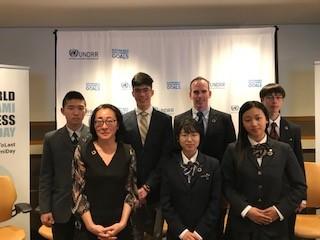
Mami Mizutori with five young representatives from the High School Student Summit and Marc McDonald from the AARP Foundation at the Intergenerational Dialogue.
By Brigitte Leoni
More than 150 government representatives, members of academia and young participants from the 2019 Japan World Tsunami Awareness Day High School Summit commemorated World Tsunami Awareness Day on 5 November at the United Nations Headquarters, New York and discussed innovative solutions to reduce tsunami risks.
The Panel discussion- co-organized by the Permanent Missions of Chile, Japan, Maldives, Australia, Indonesia, Norway and Peru as Co-Chairs of the Group of Friends of Disaster Risk Reduction, the United Nations Office for Disaster Risk Reduction, and the United Nations Development Programme- was one of the three events held in New York.
“Tsunamis are the deadliest and costliest of all disasters. In minutes, they wipe out decades of investment in development. You may think that very little can be done in the face of a 30-meter wall of water travelling at 60 kilometers an hour. However, when disaster risk reduction is applied, there is concrete evidence that it works. Even for tsunamis. said Mami Mizutori, Special Representative of the Secretary-General for Disaster Risk Reduction, UNDRR in her opening remarks.
“Risk-informed planning that limits where people can build to safe zones, ensuring that early warning systems are in place and people know what to do and building infrastructure to last are critical.”, SRSG Mizutori added.
Her remarks were strongly supported by Ambassador Tijjani Muhammad-Bande, President of the 74th session of the United Nations General Assembly who urged Member States to have disaster risk reduction (DRR) strategies in place to accelerate Sustainable Development Goals implementation.
“I commend the 95 Member States who have developed national and local DRR strategies and call on all remaining member states who have not done so to include all stakeholders, including civil society, in the decision-making processes as they move forward so as to ensure that the needs of the community – in particular women and youth- are met,” he said.
Teru Fukui, a Japanese Member of Parliament underlined the important advocacy efforts supported through the 2019 High School Student Summit for WTAD, which this year was held in Hokkaido, Japan. More than 400 students from 44 countries attended.
“We are pleased today to have five students from the Hokkaido summit with us at the United Nations. We value their opinions and input. High School Student Summits help us to join up how our predecessors have acted to reduce disaster risk, with ideas for the future,” added Mr.Fukui.